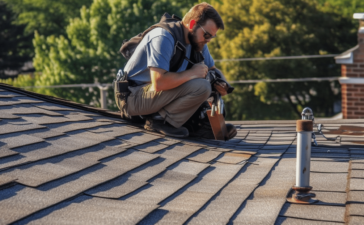When it comes to securing your property, gates are an essential component. And what holds these gates together? Hinges! Yes, those unsung heroes that allow you to effortlessly swing open and close your gate. But did you know that there are different types of hinges for gates? Each with its own unique features and benefits. So if you’re in the market for a new hinge or simply want to upgrade your existing one, this blog post is here to help! Join us as we explore the fascinating world of gate hinges and discover which type is right for you. Get ready to unlock the secrets of sturdy security with our comprehensive guide!
Basic Types of Hinges for Gates
When it comes to selecting heavy duty gate hinges for your gate, there are several basic types to choose from. Each type has its own unique features and benefits. Let’s explore some of the most common options:
1. Butt Hinges: These traditional hinges consist of two rectangular metal plates joined by a pin. They offer simple and reliable functionality, making them suitable for both small and large gates.
2. Strap Hinges: Known for their decorative appeal, strap hinges feature long straps that are attached to the gate frame and post. They provide a classic look and can support heavy-duty gates.
3. Pivot Hinges: These hinges are designed to allow the gate to swing smoothly on a fixed point at the bottom or top of the frame. They offer excellent weight-bearing capabilities but may require additional space behind the gate.
4. Self-Closing Hinges: Ideal for pool enclosures or other areas where safety is paramount, self-closing hinges automatically return the gate to a closed position after opening.
5. Piano Hinges: Also called continuous hinges, piano hinges run along the entire length of the gate panel, providing maximum support and stability.
Now that you have an overview of these basic hinge types, you can consider their pros and cons before making your decision!
Pros and Cons of Each Type
When it comes to selecting hinges for your gate, understanding the pros and cons of each type is crucial. Let’s explore some of the most common types and what sets them apart.
First up, we have butt hinges. These are a popular choice due to their simplicity and durability. They offer strong support for heavier gates but may require periodic maintenance to keep them in optimal condition.
Next, we have strap heavy duty gate hinges which provide both functionality and an appealing aesthetic. With their decorative design, they can add a touch of elegance to any gate. However, they may not be as sturdy as other hinge types and could potentially sag over time.
Another option is the piano hinge, also known as continuous hinges. These are ideal for long gates or those that need extra stability along its entire length. While they offer excellent strength and durability, installation can be more complex compared to other hinge types.
We have self-closing hinges which are perfect for pool or security gates where automatic closure is desired. They provide convenience by ensuring that the gate always remains closed after use. However, these hinges may require regular adjustments to maintain proper alignment.
Choosing the Right Hinge for Your Gate
Choosing the right hinge for your gate is an important decision that can greatly impact its functionality and durability. With so many options available, it’s crucial to consider a few key factors before making your choice.
One factor to consider is the weight of your gate. If you have a heavy gate, such as one made of solid wood or metal, you’ll need a hinge that can support its weight without sagging or breaking over time. In this case, heavy-duty hinges like strap hinges or butt hinges would be suitable options.
Another consideration is the style of your gate. Different types of gates require different types of hinges to ensure proper operation and aesthetics. For instance, if you have a decorative wrought iron gate, you may want to opt for ornamental heavy duty gate hinges that complement its design.
Additionally, think about the level of security you desire for your gate. If security is a top priority, choosing hinges with features like tamper-resistant pins or concealed installation can help enhance safety and deter unauthorized access.
Don’t forget about maintenance requirements when selecting a hinge for your gate. Some designs may require regular lubrication or adjustments to ensure smooth opening and closing over time.
By taking these factors into account and doing some research on the various types of hinges available in the market today, you will be able to make an informed decision on which hinge is best suited for your specific needs.
Factors to Consider When Selecting a Hinge
When it comes to selecting the right hinge for your gate, there are a few important factors you should consider. These factors will help ensure that you choose a hinge that not only meets your functional needs but also complements the overall aesthetics of your gate.
1. Gate Material: The material of your gate is crucial in determining the type of hinge that will work best. Different materials have different weight and structural requirements, so it’s essential to find a hinge that can support the specific characteristics of your gate material.
2. Gate Size and Weight: The size and weight of your gate will play a significant role in determining which type of hinge can handle the load effectively. Heavier gates may require heavy-duty hinges or even adjustable hinges that provide additional support.
3. Swing Direction: Consider whether you need an inward or outward swinging gate and select a hinge accordingly. Also, think about any obstructions around the area where the gate swings open to ensure there is enough clearance for smooth operation.
4. Security Requirements: If security is a top priority, choose hinges with features like tamper-proof pins or self-closing mechanisms to enhance safety and prevent unauthorized access.
5. Climate and Environmental Factors: Outdoor gates are exposed to various weather conditions such as rain, snow, or extreme heat. It’s important to select hinges made from materials resistant to corrosion and able to withstand environmental elements over time without deteriorating.
6.Installation Method: Consider how easy it is to install and maintain each type of hinge before making your final decision.
Taking into account these installation aspects can save both time during setup stages & maintenance down-the-line
By carefully considering these factors when selecting a hinge for your gate project,you can make an informed decision based on functionality,durability,and aesthetic appeal.
In doing so,you’ll ensure that you’ve chosen the perfect hinge for long-lasting performance while enhancing both form & function of your gate.





